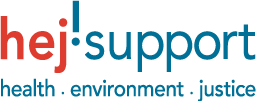
NGOs suggest elements for a High Level Declaration on international chemicals and waste policy
Featured.
A group of NGOs, coordinated by HEJSupport and SSNC, submitted their thoughts on important elements on a High Level Declaration (HLD) to be developed in the frame of the Beyond SAICM 2020 process.
.
.

.
.
NGO group input to the High Level Declaration (HLD)
Enabling framework for chemicals and waste
The HLD should stress the necessity of an enabling framework for chemicals and waste as a key supportive function to the SAICM successor, and that the UNGA decision, giving mandate to the framework, also should call all IGOs relevant for chemicals and waste management and health to integrate the SAICM successor in their work strategies. The rationale for the enabling framework is well-articulated in the information document submitted by the German government [1].
Alignment of the chemicals and waste clusters with those of biodiversity and climate
Chemicals and waste crosscut the sustainable development goals, and this function must be emphasised in the HLD, as well as there must be a call for the chemicals and waste policy clusters, and the policy clusters for strengthened biodiversity and to halt climate change, to align better. The NGOs submitting this input believe that a UNGA decision will be instrumental to support the above call for better alignment of the chemicals and waste clusters with the biodiversity and climate change clusters.
Functions of the ICCM
The functions and mandates of the ICCM must be clearly articulated in the HLD, and some new may need to be added to make the successor to SAICM stronger. This includes the mandate to propose IoCs, for which progress with voluntary actions is too slow, for increased obligations outside the frames of the SAICM successor (see the IoC section below and a detailed paper on New Mechanism of Action: elevation of obligations to progress SAICM Issues of Concerns (IoCs) in the post 2020 multilateral regime for chemicals and waste1[2]).
Uneven progress and differential needs among countries
The HLD should recognize that progress in the work towards sound management of chemicals and waste continuous to vary among countries, due to lack of technical resources, financial resources, including policy inconsistences between countries, and that all of these factors may worsen in the aftermath of the COVID19 pandemic. Furthermore, the HDL should stress that these differences must be evened out with even greater urgency as the world needs a more environmentally sustainable economic recovery after the pandemic.
In the successor to SAICM, efforts to transfer safe know-how and technologies to countries in need, skill-sharing of suitable policy instruments and experiences of operating them, increased sharing of data on toxic chemicals health and environmental effects and their presence inside and outside the supply chain of products throughout product lifecycle, implementation of the GHS, and harmonization of other standards, in particular for chemicals of global concern, must increase substantially.
These efforts, of course, require new and sufficient financial resources provided on a sustainable basis that includes the internalization of costs within relevant producer industries.
Financing
Sustainable financing is a keystone for effective implementation of the Global Plan of Action of the successor to SAICM, so the HLD must give a clear signal of the necessity to not just build on the Integrated Approach to long-term funding of the Chemicals and Waste Agenda, but also incorporate novel approaches to financing.
Recently, the Centre for International Environmental Law (CIEL) and the International Pollutants Elimination Network (IPEN) published a report outlining a policy mechanism building on the polluter pays principle[3]. This mechanism, in effect, is a “global” tax leveraged from the chemical industry for basic chemicals. The tax would replace the Responsible Care Programme, through which industry now largely controls what they fund, and thus may create situations where commercial interests primarily dictate the allocation of the funds. There are similar initiatives to the one suggested by the report already existing, for example the International Oil Pollution Compensation Funds. The NGOs behind this submission fully support the proposal by IPEN and CIEL.
Issues of Concern
The HLD must stress the urgent need to see substantial progress in the work with Issues of Concern (IoCs), which requires stepping up the IoC work considerably, through higher ambition level in the voluntary actions under the SAICM successor, but not excluding through elevation of obligations outside its frames.
This idea was first highlighted by a group of NGOs and presented in details in several information documents submitted to the SAICM Secretariat during the Intersessional Process, [2] [4], [5], [6]. The core document describes a new mechanism of action, based on evaluation criteria for IoCs that could trigger the IoCs, or specific aspects of them, for consideration of elevated obligations within and outside the frames of the SAICM successor.[2]
Each IoC needs a clear workplan with targets, milestones, and indicators. A formalised periodic review system of reporting on progress should be set up and could form the basis of the effectiveness evaluation of the new beyond 2020 framework along with assessment of financial and capacity building needs. An expert panel should be set up to review the reports and propose recommendations.
The idea to elevate obligations for the work on IoCs was further developed in the recently published UNEP assessment report on SAICM IoCs [7]. The report gives support for the suggested new mechanism of action, as it identified that voluntary actions may be insufficient. The UNEP assessment is based on a review of evidence published within the past decade and presents the current status of the eight IoCs. The assessment identified an urgent need to step up the work with the existing IoCs, and a number of suggested candidates, including through binding instruments. It pointed out that progress in the IoC work has been uneven between countries, and that policy inconsistences across countries hamper progress.
For this to be able to happen, the HLD should emphasize that the ICCM would need to be mandated to issue resolutions calling the UNEA or the UNGA to in turn issue resolutions requesting existing legally binding instruments to investigate if and how the IoCs, or specific aspects of them, can be included, or new instruments to be developed. The ICCM mandate and mechanism to move the IoC outside the frames of the SAICM successor would need to be inscribed in the new SAICM text.
Circular economy
The HLD must highlight a toxic-free circular economy as a key strategy to address a number of targets to the SDGs.
A toxic-free circular economy would ensure transparency of information on toxic chemicals within the product lifecycle, reduce the need for new virgin raw materials and associated needs for energy, water and processing/refining chemicals in connection with extraction/production, refining of materials and manufacturing of products. Thereby, it could reduce climate impact, chemical pollution, water stress and other negative impacts on the ecosystems, and at the same time address the waste issue.
The global importance of the circular economy is attested by several resolutions adopted at UNEA4 [8].
It is further attested by the fact the EU is in the dedicated process of transforming its economy according to a Circular Economy Action plan first launched in 2015, and since then expanded and updated [9], adjusting all product, chemicals and waste legislation of the EU to support the circular economy. In its recently updated Chemicals Strategy, the EU points to the need for mainstreaming the transition to a toxic-free circular economy as an essential element for sustainable development globally [10]. It also dedicates to international cooperation and partnerships, in bilateral, regional and multilateral agreements to share experiences and build capacity internationally around the circular economy.
The importance of circular economy also stresses the urgent need to fulfil the objectives of the CiP Programme [11], as transparency is a keystone in circular economy.
.
For more information, please contact:
Health and Environment Justice Support (HEJSupport)
Olga Speranskaya, olga.speranskaya@hej-support.org
Alexandra Caterbow, alexandra.caterbow@hej-support.org
Swedish Society for Nature Conservation (SSNS)
Andreas Prevodnik, andreas.prevodnik@naturskyddsforeningen.se
Groundwork/Friends of the Earth South Africa
Rico Euripidou, rico@groundwork.org.za
Canadian Environmental Law Association
Fe de Leon, deleonf@cela.ca
BUND/Friends of the Earth, Germany
Manuel Fernández, Manuel.Fernandez@bund.net
Forum Umwelt und Entwicklung
Wolfgang Obenland, obenland@forumue.de
RightOnCanada
Kathleen Ruff, kruff@starlynx.ca
Pestizid Aktions-Netzwerk e.V. (PAN Germany)
Susan Haffmans, susan.haffmans@pan-germany.org
PAN North America
Kristin S. Schafer, kristins@panna.org
PAN Aotearoa New Zealand
Meriel Watts, meriel@merielwatts.net
PAN UK
admin@pan-uk.org
Armenian Women for Health and Healthy Environment (AWHHE)
Gohar Khojayan, gohar.khojayan@gmail.com
Eco-Accord, Russia
Olga Ponizova, ecoaccord@gmail.com
Women Engaged for a Common Future (WECF)
Johanna Hausmann, johanna.hausmann@wecf-consultant.org
TOXISPHERA, Brazil
Zuleica Nycz, zuleica.nycz@gmail.com
Greenwomen, Kazakhstan
Lidia Astanina, lidia.astanina@gmail.com
Chemical Safety Agency, Ukraine
Denis Pavlovsky, dpavlovskyi88@gmail.com
.
[1] Enhancing the sound management of chemicals and waste beyond 2020 (http://www.saicm.org/Portals/12/documents/meetings/IP3/INF/SAICM_IP3_INF4_EnhancingGovernanceSMCW.pdf).
[2] New Mechanism of Action: elevation of obligations to progress SAICM Issues of Concern (IoCs) in the post 2020 multilateral regime for chemicals and waste (http://www.saicm.org/Portals/12/documents/meetings/IP4/stakeholders/IoC_2020_New_Mechanism_of_Action.pdf).
[3] https://ipen.org/sites/default/files/documents/ipen-ciel-producer-responsibility-vf1_9e-web-en.pdf
[4] New Mechanism of Action: elevation of obligations to progress SAICM Issues of Concern (IoCs) in the post 2020 multilateral regime for chemicals and waste: the case Chemicals in Products (CiP) (http://www.saicm.org/Portals/12/documents/meetings/IP4/stakeholders/Case-CiP-Increased-obligations.pdf)
[5] New Mechanism of Action: elevation of obligations to progress SAICM Issues of Concern (IoCs) in the post 2020 multilateral regime for chemicals and waste: the case Highly Hazardous Pesticides (HHPs) (http://www.saicm.org/Portals/12/documents/meetings/IP4/stakeholders/Case-HHPs-PAN-INT.pdf).
[6] New Mechanism of Action: elevation of obligations to progress SAICM Issues of Concern (IoCs) in the post 2020 multilateral regime for chemicals and waste: the case Per and Poly Fluoroalkyl Substances (PFASs) (http://www.saicm.org/Portals/12/documents/meetings/IP3/stakeholders/IPEN-Case-PFAS.pdf)
[7] Retrieved 25-10-2020 from the UNEP webpage (https://wedocs.unep.org/handle/20.500.11822/33807).
[8] UNEP/EA.4/Res.6 (http://wedocs.unep.org/bitstream/handle/20.500.11822/28471/English.pdf?sequence=3&isAllowed=y), UNEP/EA.4/Res.7 (http://wedocs.unep.org/bitstream/handle/20.500.11822/28472/English.pdf?sequence=3&isAllowed=y), UNEP/EA.4/Res.8 (http://wedocs.unep.org/bitstream/handle/20.500.11822/28518/English.pdf?sequence=3&isAllowed=y), and UNEP/EA.4/Res.19 (http://wedocs.unep.org/bitstream/handle/20.500.11822/28501/English.pdf?sequence=3&isAllowed=y)
[9] EU Circular Economy Action Plan, 2020 version (https://ec.europa.eu/environment/circular-economy/pdf/new_circular_economy_action_plan.pdf).
[10] EU Chemicals Strategy 2020 (https://ec.europa.eu/environment/pdf/chemicals/2020/10/Strategy.pdf).
[11] http://www.saicm.org/Portals/12/Documents/EPI/CiP%20programme%20October2015_Final.pdf



